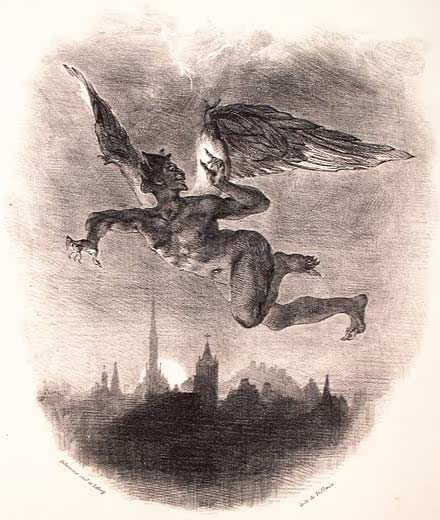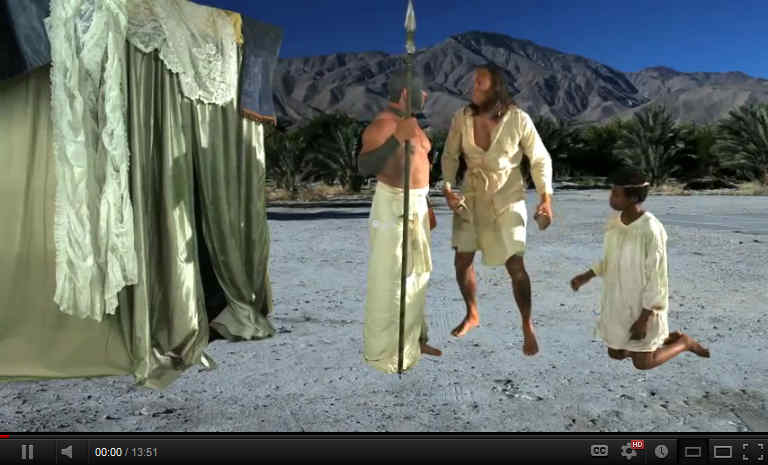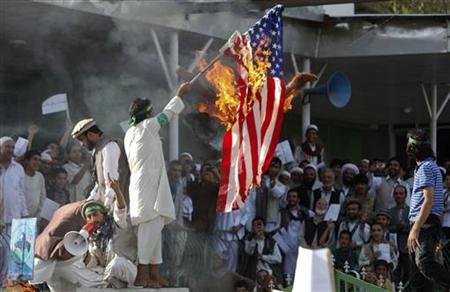Confession
To what verse is Ibn Ishaq alluding?
"We have not sent any apostle or prophet before thee,
among whose desires Satan injected not some wrong desire, but God
shall bring to nought that which Satan had
suggested." (Sura 22:51).
Like a toddler caught in the act, Mohammed cannot help
incriminating others, even dragging the prior prophets into the same
predicament! Though the story of the Satanic verses is extra-Koranic,
it is well founded. Sura 17:74-76 reads almost like a confession:
"And, verily, they had well nigh beguiled thee from what we revealed
to thee, and caused thee to invent some other thing in our name: but in
that case they would surely have taken thee as a friend; And had we not
settled thee, thou hadst well nigh leaned to them a little. . ."
It seems Mohammed desired popularity: "A renowned Muslim
historian, Abu Ja'far Muhammad bin Jarir al-Tabari (838-923 A.D.),
had this to say in his Ta'rikh al-rasul wa'l muluk (History of
Prophets and Kings): 'The prophet was eager for the welfare of his
people, desiring to win them to him by any means he could. . .With
his love for his people and his eagerness for them, it would gladden
him if some of the hard things he had found in dealing with them
could be alleviated. He pondered this in himself, longed for it, and
desired it. . ."These are the high-flying cranes and their
intercession is to be hoped for.". . .When the Quraysh heard this,
they rejoiced and were happy and delighted at the way in which he
spoke of their gods, and they listened to him, while the Muslims,
having complete trust in their Prophet in respect of the messages which
he brought from God, did not suspect him of error, illusion, or
mistake.'" (quoted in Hussein Hajji Wario, Cracks in the Crescent, pp.
235-237). It's a shame that they were so trusting; if any of the
Muslims had died in the interval between the handing down of the
Satanic verses and their cancellation, they died as pagan idolators, and
their blood was on this misleader's hands.

Conclusion
The Quraysh were pagan polytheists who resisted Mohammed's
message of monotheism. So he changed it. Gabriel was powerless to stop him. God could only work on his
conscience afterward, promising "God will annul what Satan has
suggested." Mohammed was in the driver's seat; it's his book,
not God's.
So what is the ultimate guarantor of the Koran's authenticity?
Mohammed's conscience. And who was Mohammed? A camel thief. The
problem left over from the Satanic verses is this: was all the error
expunged?:
"The nagging question remains: If Muhammad could
confidently report as revelation from Allah something that turned
out to be (according to Islamic tradition itself) a perversion from
Satan, how can one be certain that there are not further perversions
that were not caught or corrected?" (Understanding the Koran, Mateen
Elass, Kindle location 438).
A Christian must reply, no, there remain Satanic verses never
corrected, including misunderstanding of the trinity, denial of
Jesus' Sonship, and other human error. The quality control process came near
to failing once, they admit; how great a leap does it demand, to
realize it failed on other occasions as well? According to the Hadith,
Mohammed was by no means immune to enchantment and demonic influence:
"Narrated Aisha:
"Magic was worked on Allah's
Apostle so that he used to think that he had sexual relations with
his wives while he actually had not (Sufyan said: That is the
hardest kind of magic as it has such an effect). Then one day he
said, 'O 'Aisha do you know that Allah has instructed me concerning
the matter I asked Him about? Two men came to me and one of them sat
near my head and the other sat near my feet. The one near my head
asked the other. What is wrong with this man?' The latter replied
the is under the effect of magic The first one asked, Who has worked
magic on him?' The other replied Labid bin Al-A'sam, a man from Bani
Zuraiq who was an ally of the Jews and was a hypocrite.'"
(Sahih al-Bukhari, Volume 7, Book 71, Number 660).
This seems to suggest that, at times in his life, Mohammed was actually delusional.
Perhaps caution is indicated in receiving any revelations directed
to such a man. If one can't be sure from what quadrant of the spiritual
universe the message parcel was delivered, don't open it.
The Satanic verses are not the only cancelled verses of the
Koran; several others are mentioned in the Hadith: "Then Allah
revealed to us a verse that was among the cancelled ones later on.
It was: 'We have met our Lord and He is pleased with us and has made
us pleased.'" (Sahih al-Bukhari, Volume 5, Book 59, Number 417). If
the Koran is, as is sometimes claimed, the copy of a heavenly
exemplar, it is mysterious why anything in it required to be
cancelled.

|


